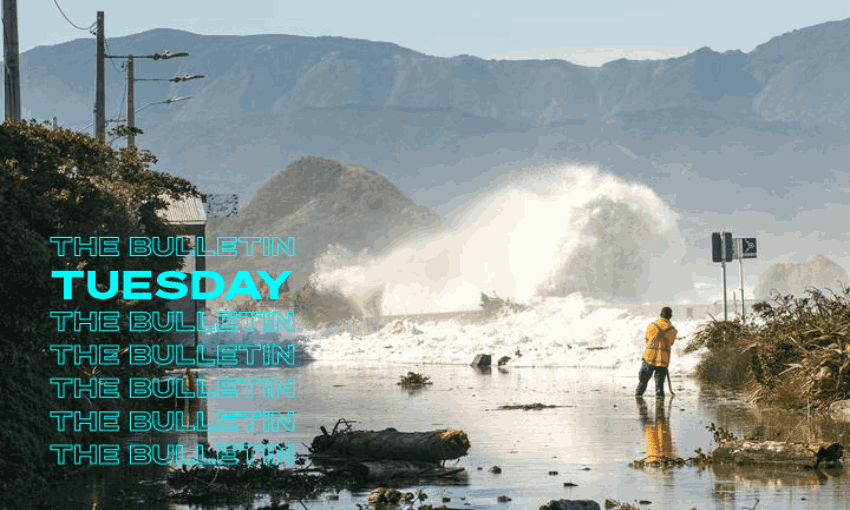Sea level rise reality hits home
Data showing sea level rise will occur twice as fast puts climate change on front page
Mōrena and welcome to The Bulletin for May 3, by Anna Rawhiti-Connell. Presented in partnership with Z Energy.
In today’s edition: back and forth on wealth tax; unaffordable infrastructure needs; 40 years of paper delivery; but first, sea level rise reality
Road between Ōwhiro Bay and Island Bay (Photo: RNZ / Supplied / Grant Maiden)
Sea level rise will occur much faster than we thought
NZ SeaRise, a five-year research project led by scientists at Victoria University of Wellington published a tool yesterday that allows you to see exactly which areas will be affected by sea level rises. The tool was accompanied by a report that told us sea levels are rising twice as fast as expected. In some places, 30cm of sea level rise isn't 40-50 years away, but 10-20. One of the report’s biggest findings is that we will be impacted by sea level rises because parts of the country are sinking.
Climate change impact hits home and the headlines
The story led the 6pm bulletin on Newshub on Sunday night and maintained prominence across New Zealand news sites and bulletins throughout yesterday. “SeaRise NZ” was sitting at number one on Google’s daily search trend list for May 2 in New Zealand this morning. We’ve had plenty of stories about adverse weather events caused by climate change before but there is something powerful about being able to see how it will affect your own area or home. Before the new tool was launched the ODT published an editorial saying it was time to agree that climate change is actually happening and get on with doing something about it.
Site experiences heavy traffic
The site was very popular when it launched yesterday morning, but was having some problems yesterday. Project co-leader Tim Naish believed the site was the target of a cyber attack. Climate change editor Eloise Gibson and data journalist Felippe Rodrigues at Stuff have also used the data to build a great interactive map where you can see the impact of sea level rise at a regional level.
$17bn of property expected to be uninsurable in next few decades
Tom Logan, an assistant professor at the University of Canterbury, has taken a look at who might pay if your property is impacted by rising sea levels. Not the insurance companies, he says. Logan says “you’ll likely lose all private insurance once the chance [of coastal damage] rises to 5% which is now anticipated to be less than 25 years away”. Following the launch of the draft National Adaptation Plan last week, Insurance Council chief executive Tim Grafton said the risk of climate change is “a risk management problem that goes well beyond the role of insurance." Consultation on that draft plan ends on June 3. Toby Manhire spoke to an Ōwhiro Bay local about what's needed by those who may lose their homes.
We are on a mission to ensure independent journalism thrives in Aotearoa. Will you help us? Become a Spinoff member today and join a community of your fellow readers whose generous support funds our journalism and ensures we can continue bringing you powerful, original stories about the Aotearoa that was and will be. Head over here to find out more about how you can support our mahi.
Wealth tax question kicks off new round of the “rule out game”
Prime minister Jacinda Ardern was questioned about a wealth tax on AM yesterday and said “You're asking me to project into the next election and beyond. I am not going to do that because we haven't formulated our tax policy for the 2023 election." It was somewhat less equivocal than her 2020 statement when she said"I won't allow it to happen as PM.” Both National and Act were quick to say that it amounts to a backtrack. Ardern was firm at the post-cabinet press conference saying ““nothing has changed” about her stance on a wealth tax – “end of story”. Stuff’s chief political reporter, Henry Cooke, has written a reflective column about this back and forth, or as he calls it, “the rule out game”.
Infrastructure strategy outlines need for $31bn annual spend
Climate change commissioner Rod Carr said we “cannot afford to put back everything that will be damaged" in his response to the new data on rising sea levels. Grant Robertson has been equally clear in his comments about a new 30-year infrastructure strategy, saying we also cannot afford to build our way out of an infrastructure deficit. The Infrastructure Commission report found we’d need to spend nearly twice as much as we currently spend to cover the deficit and build for the future. Thomas Coughlan at the NZ Herald (paywalled) provides clear analysis of the report. The government will respond to it in September.
PM says spending is up after return of Australian tourists
21 flights landed at Auckland international airport yesterday. Unfortunately, for some, they missed the large welcome sign after a wind direction change. The prime minister said there are 33,000 people arriving from overseas each week. Before the pandemic, about 3.9m people visited annually, an average of 75,000 a week. Data from Worldline shows spending hit $420 million over the four-day Easter period – 8% higher than 2019. CEO of Air NZ, Greg Foran has asked that pre-departure testing be done away with, saying it “adds friction” and citing the new rapid and more accurate LAMP test trial as another tool in the toolbox.
Joe Goddard’s work as Vodafone New Zealand’s Experience and Commercial Director is all about creating awesome customer experiences for Aotearoa. Over the pandemic it has been clearer than ever how much New Zealanders rely on stable connection and a good customer experience.“We go to work every day, knowing that New Zealanders depend on our service,” Goddard says, “knowing that what we do matters is a privilege”. He shared his tips for finding the balance between staying connected and switching off with The Spinoff here.
Learn more about how Vodafone can help you to embrace the magic of technology (sponsored).
The Waikato Times turns 150, Carol’s been delivering it for 40 years
I grew up reading the Waikato Times. I used to think having a bike with a red satchel full of the region’s paper of record was the pinnacle of the paper delivery game. To mark the paper’s 150th birthday, Richard Walker has written a really lovely profile of Carol Dix, who’s been delivering the Times for 40 years. She picked up the job from her dad who loved rugby and didn't want to miss it on Saturdays. Carol has clocked up 1800km a week, and must have a throwing arm the Black Caps would envy.
Reader feedback
On yesterday's topic of youth crime rates and school attendance, Alison writes: “It would be great if the Bulletin could call out the use of the term truancy. A better term (that avoids stigmatising kids and their parents) is attendance rates. A focus on getting attendance rates up is a much more positive (and accurate) way of discussing the topic.” Thanks Alison - it’s sometimes too easy to retread unhelpful terms.
Got some feedback about The Bulletin, or anything in the news? Get in touch with me at thebulletin@thespinoff.co.nz
Don Rowe reviews a new book that explores the ways we remember – and forget – the New Zealand Wars; Sam Brooks goes in to bat for a maligned streaming service; Business is Boring talks to the co-founder of a company combining a love of kaimoana with a passion for sustainability; Kerry Sunderland meets three New Zealanders who've sworn off air travel to help save the environment.















